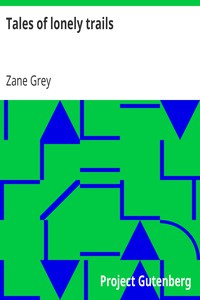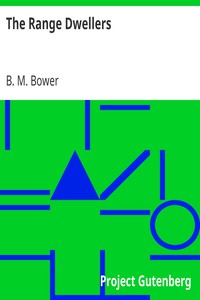Tales of lonely trails by Zane Grey (best affordable ebook reader .TXT) 📗

- Author: Zane Grey
Book online «Tales of lonely trails by Zane Grey (best affordable ebook reader .TXT) 📗». Author Zane Grey
But my horse was new to this bear chasing. He was mettlesome, and he did not want to do what I wanted. When I jabbed the spurs into his flanks he nearly bucked me off. I was looking for a soft place to light when he quit. Long before I got down that open slope Teague and R.C. had disappeared. I had to follow their tracks. This I did at a gallop, but now and then lost the tracks, and had to haul in to find them. If I could have heard the hounds from there I would have gone on anyway. But once down in the jack-pines I could hear neither yell or bay. The pines were small, close together, and tough. I hurt my hands, scratched my face, barked my knees. The horse had a habit of suddenly deciding to go the way he liked instead of the way I guided him, and when he plunged between saplings too close together to permit us both to go through, it was exceedingly hard on me. I was worked into a frenzy. Suppose R.C. should come face to face with that old grizzly and fail to kill him! That was the reason for my desperate hurry. I got a crack on the head that nearly blinded me. My horse grew hot and began to run in every little open space. He could scarcely be held in. And I, with the blood hot in me too, did not hold him hard enough.
It seemed miles across that wooded bench. But at last I reached another slope. Coming out upon a canyon rim I heard R.C. and Teague yelling, and I heard the hounds fighting the grizzly. He was growling and threshing about far below. I had missed the tracks made by Teague and my brother, and it was necessary to find them. That slope looked impassable. I rode back along the rim, then forward. Finally I found where the ground was plowed deep and here I headed my horse. He had been used to smooth roads and he could not take these jumps. I went forward on his neck. But I hung on and spurred him hard. The mad spirit of that chase had gotten into him too. All the time I could hear the fierce baying and yelping of the hounds, and occasionally I heard a savage bawl from the bear. I literally plunged, slid, broke a way down that mountain slope, riding all the time, before I discovered the footprints of Teague and R.C. They had walked, leading their horses. By this time I was so mad I would not get off. I rode all the way down that steep slope of dense saplings, loose rock slides and earth, and jumble of splintered cliff. That he did not break my neck and his own spoke the truth about that roan horse. Despite his inexperience he was great. We fell over one bank, but a thicket of aspens saved us from rolling. The avalanches slid from under us until I imagined that the grizzly would be scared. Once as I stopped to listen I heard bear and pack farther down the canyon—heard them above the roar of a rushing stream. They went on and I lost the sounds of fight. But R.C.'s clear thrilling call floated up to me. Probably he was worried about me.
Then before I realized it I was at the foot of the slope, in a narrow canyon bed, full of rocks and trees, with the din of roaring water in my ears. I could hear nothing else. Tracks were everywhere, and when I came to the first open place I was thrilled. The grizzly had plunged off a sandy bar into the water, and there he had fought the hounds. Signs of that battle were easy to read. I saw where his huge tracks, still wet, led up the opposite sandy bank.
Then, down stream, I did my most reckless riding. On level ground the horse was splendid. Once he leaped clear across the brook. Every plunge, every turn I expected to bring me upon my brother and Teague and that fighting pack. More than once I thought I heard the spang of the .35 and this made me urge the roan faster and faster.
The canyon narrowed, the stream-bed deepened. I had to slow down to get through the trees and rocks. And suddenly I was overjoyed to ride pell-mell upon R.C. and Teague with half the panting hounds. The canyon had grown too rough for the horses to go farther and it would have been useless for us to try on foot. As I dismounted, so sore and bruised I could hardly stand, old Jim came limping in to fall into the brook where he lapped and lapped thirstily. Teague threw up his hands. Old Jim's return meant an ended chase. The grizzly had eluded the hounds in that jumble of rocks below.
"Say, did you meet the bear?" queried Teague, eyeing me in astonishment and mirth.
Bloody, dirty, ragged and wringing wet with sweat I must have been a sight. R.C. however, did not look so very immaculate, and when I saw he also was lame and scratched and black I felt better.
The Grand Canyon of Arizona is over two hundred miles long, thirteen wide, and a mile and a half deep; a titanic gorge in which mountains, tablelands, chasms and cliffs lie half veiled in purple haze. It is wild and sublime, a thing of wonder, of mystery; beyond all else a place to grip the heart of a man, to unleash his daring spirit.
On April 20th, 1908, after days on the hot desert, my weary party and pack train reached the summit of Powell's Plateau, the most isolated, inaccessible and remarkable mesa of any size in all the canyon country. Cut off from the mainland it appeared insurmountable; standing aloof from the towers and escarpments, rugged and bold in outline, its forest covering like a strip of black velvet, its giant granite walls gold in the sun, it seemed apart from the world, haunting with its beauty, isolation and wild promise.
The members of my party harmoniously fitted the scene. Buffalo Jones, burly-shouldered, bronze-faced, and grim, proved in his appearance what a lifetime on the plains could make of a man. Emett was a Mormon, a massively built grey-bearded son of the desert; he had lived his life on it; he had conquered it and in his falcon eyes shone all its fire and freedom. Ranger Jim Owens had the wiry, supple body and careless, tidy garb of the cowboy, and the watchful gaze, quiet face and locked lips of the frontiersman. The fourth member was a Navajo Indian, a copper-skinned, raven-haired, beady-eyed desert savage.
I had told Emett to hire some one who could put the horses on grass in the evening and then find them the next morning. In northern Arizona this required more than genius. Emett secured the best trailer of the desert Navajos. Jones hated an Indian; and Jim, who carried an ounce of lead somewhere in his person, associated this painful addition to his weight with an unfriendly Apache, and swore all Indians should be dead. So between the two, Emett and I had trouble in keeping our Navajo from illustrating the plainsman idea of a really good Indian—a dead one.
While we were pitching camp among magnificent pine trees, and above a hollow where a heavy bank of snow still lay, a sodden pounding in the turf attracted our attention.
"Hold the horses!" yelled Emett.
As we all made a dive among our snorting and plunging horses the sound seemed to be coming right into camp. In a moment I saw a string of wild horses thundering by. A noble black stallion led them, and as he ran with beautiful stride he curved his fine head backward to look at us, and whistled his wild challenge.
Later a herd of large white-tailed deer trooped up the hollow. The Navajo grew much excited and wanted me to shoot, and when Emett told him we had not come out to kill, he looked dumbfounded. Even the Indian felt it a strange departure from the usual mode of hunting to travel and climb hundreds of miles over hot desert and rock-ribbed canyons, to camp at last in a spot so wild that deer were tame as cattle, and then not kill.
Nothing could have pleased me better, incident to the settling into permanent camp. The wild horses and tame deer added the all-satisfying touch to the background of forest, flowers and mighty pines and sunlit patches of grass, the white tents and red blankets, the sleeping hounds and blazing fire-logs all making a picture like that of a hunter's dream.
"Come, saddle up," called the never restful Jones. "Leave the Indian in camp with the hounds, and we'll get the lay of the land." All afternoon we spent riding the plateau. What a wonderful place! We were completely bewildered with its physical properties, and surprised at the abundance of wild horses and mustangs, deer, coyotes, foxes, grouse and other birds, and overjoyed to find innumerable lion trails. When we returned to camp I drew a rough map, which Jones laid flat on the ground as he called us around him.
"Now, boys, let's get our heads together."
In shape the plateau resembled the ace of clubs. The center and side wings were high and well wooded with heavy pines; the middle wing was longest, sloped west, had no pine, but a dense growth of cedar. Numerous ridges and canyons cut up this central wing. Middle Canyon, the longest and deepest, bisected the plateau, headed near camp, and ran parallel with two smaller ones, which we named Right and Left Canyons. These three were lion runways and hundreds of deer carcasses lined the thickets. North Hollow was the only depression, as well as runway, on the northwest rim. West Point formed the extreme western cape of the plateau. To the left of West Point was a deep cut-in of the rim wall, called the Bay. The three important canyons opened into it. From the Bay, the south rim was regular and impassable all the way round to the narrow Saddle, which connected it to the mainland.
"Now then," said Jones, when we assured him that we were pretty well informed as to the important features, "you can readily see our advantage. The plateau is about nine or ten miles long, and six wide at its widest. We can't get lost, at least for long. We





Comments (0)